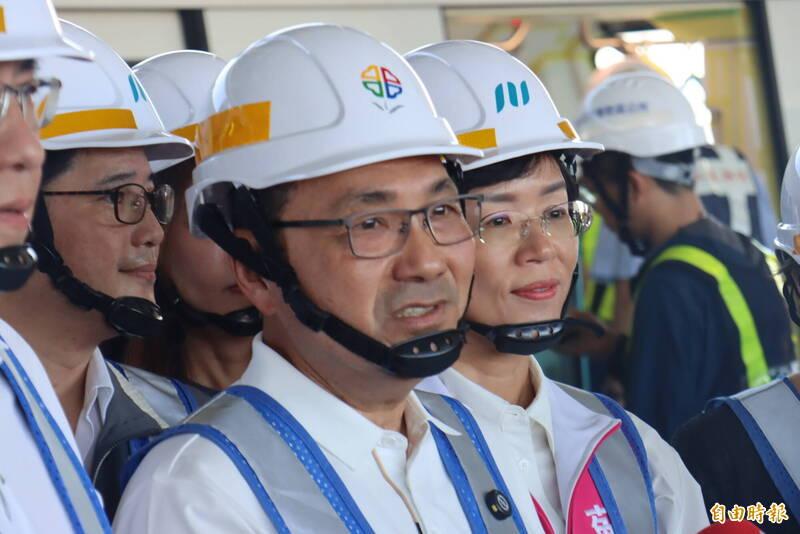The central government's recent plans to change allocations of local government subsidies to an “application-based” system has drawn criticism from the Chinese Nationalist Party (KMT), which at a Cabinet meeting today accused the Executive Yuan of “forcing local governments to beg for subsidies” under the new system and said that it intends to propose legislation to counter the new policy.
In response, Democratic Progressive Party (DPP) spokesperson Han Ying (韓瑩) said that the KMT is happy to take money but not take action, adding, “if you can’t do it, hand the job over to someone who can.”
KMT caucus secretary-general Wang Hung-wei (王鴻薇), deputy caucus whip Lo Chih-chiang (羅智強) and legislator Lai Shih-pao (賴士葆) held a media conference today to accuse the Executive Yuan of trying to control local subsidies, adding that how much is allocated would now depend solely on President William Lai (賴清德) and the cabinet.

Photo: Weng Yu-huang, Taipei Times
Following new amendments to the Act Governing the Allocation of Government Revenues and Expenditures (財政收支劃分法) each city and county has actually received increased funds with more allocated to local governments, Han said.
The amendments require the central government to adjust certain subsidies, she said. However the Taipei City Government’s allocation next year would still increase by 64 percent, up NT$44.4 billion (US$1.45 billion), while New Taipei City’s allocation would rise by 76 percent or NT$41 billion.
Despite the significant budget increases, Taipei Mayor Chiang Wan-an (蔣萬安) and Hou continue to complain to the central government about lacking subsidies for school electricity fees, instead of allocating the extra budget to cover the expenses, Han said.
Local subsidies are supposed to cover social welfare expenditures, she said.
Not a single dollar has been cut this year, contrary to KMT claims that programs such as elderly care and childcare would be affected by the changes, she added.
The DPP has always prioritized the welfare of the entire population and would not sacrifice people’s interests, she said.
Subsidies have long been allocated to each city and county according to law, though local governments hope the new system would not impact the legally-required budget for projects used to benefit disadvantaged groups or related to education, police and firefighters, New Taipei City Mayor Hou You-yi (侯友宜) said today.
Whichever method is used to distribute local subsidies, Hou said he hopes the government would continue to meet people’s needs and ensure their welfare.
Hou today inspected the progress of a public art feature and station facilities at Ceramics Old Street Station (陶瓷老街) in New Taipei’s Yingge District (鶯歌) that would be part of the Sanying MRT Line.
The new MRT line, set to open in March, would connect the city’s Tucheng (土城), Yingge and Sansia (三峽) districts.
Meanwhile, Premier Cho Jung-tai (卓榮泰) said today at the Cabinet meeting that subsidies must be adjusted to avoid impacting national defense, foreign affairs and economic policies.
Those adjustments would require local governments to take responsibility for expenditures including school electricity fees and earthquake-proofing public buildings, while the central government would still cover up to 50 percent of expenditure for waste-water and road projects, he said.
Financing for major policy projects would still be the responsibility of the central government, he added.
Moreover, Taipei Mayor Chiang recently criticized the Directorate-General of Budget, Accounting and Statistics (DGBAS) for redefining local subsidies to cut allocations for individual cities.
Chiang “could not accept” the cabinet’s new allocation system as it could easily lead to unfair distribution, he said at today’s cabinet meeting.

The Coast Guard Administration (CGA) yesterday said it had deployed patrol vessels to expel a China Coast Guard ship and a Chinese fishing boat near Pratas Island (Dongsha Island, 東沙群島) in the South China Sea. The China Coast Guard vessel was 28 nautical miles (52km) northeast of Pratas at 6:15am on Thursday, approaching the island’s restricted waters, which extend 24 nautical miles from its shoreline, the CGA’s Dongsha-Nansha Branch said in a statement. The Tainan, a 2,000-tonne cutter, was deployed by the CGA to shadow the Chinese ship, which left the area at 2:39pm on Friday, the statement said. At 6:31pm on Friday,

The Chinese People’s Liberation Army Navy’s (PLAN) third aircraft carrier, the Fujian, would pose a steep challenge to Taiwan’s ability to defend itself against a full-scale invasion, a defense expert said yesterday. Institute of National Defense and Security Research analyst Chieh Chung (揭仲) made the comment hours after the PLAN confirmed the carrier recently passed through the Taiwan Strait to conduct “scientific research tests and training missions” in the South China Sea. China has two carriers in operation — the Liaoning and the Shandong — with the Fujian undergoing sea trials. Although the PLAN needs time to train the Fujian’s air wing and

Taiwanese celebrities Hank Chen (陳漢典) and Lulu Huang (黃路梓茵) announced yesterday that they are planning to marry. Huang announced and posted photos of their engagement to her social media pages yesterday morning, joking that the pair were not just doing marketing for a new show, but “really getting married.” “We’ve decided to spend all of our future happy and hilarious moments together,” she wrote. The announcement, which was later confirmed by the talent agency they share, appeared to come as a surprise even to those around them, with veteran TV host Jacky Wu (吳宗憲) saying he was “totally taken aback” by the news. Huang,

The American Institute in Taiwan (AIT) put Taiwan in danger, Ma Ying-jeou Foundation director Hsiao Hsu-tsen (蕭旭岑) said yesterday, hours after the de facto US embassy said that Beijing had misinterpreted World War II-era documents to isolate Taiwan. The AIT’s comments harmed the Republic of China’s (ROC) national interests and contradicted a part of the “six assurances” stipulating that the US would not change its official position on Taiwan’s sovereignty, Hsiao said. The “six assurances,” which were given by then-US president Ronald Reagan to Taiwan in 1982, say that Washington would not set a date for ending arm sales to Taiwan, consult